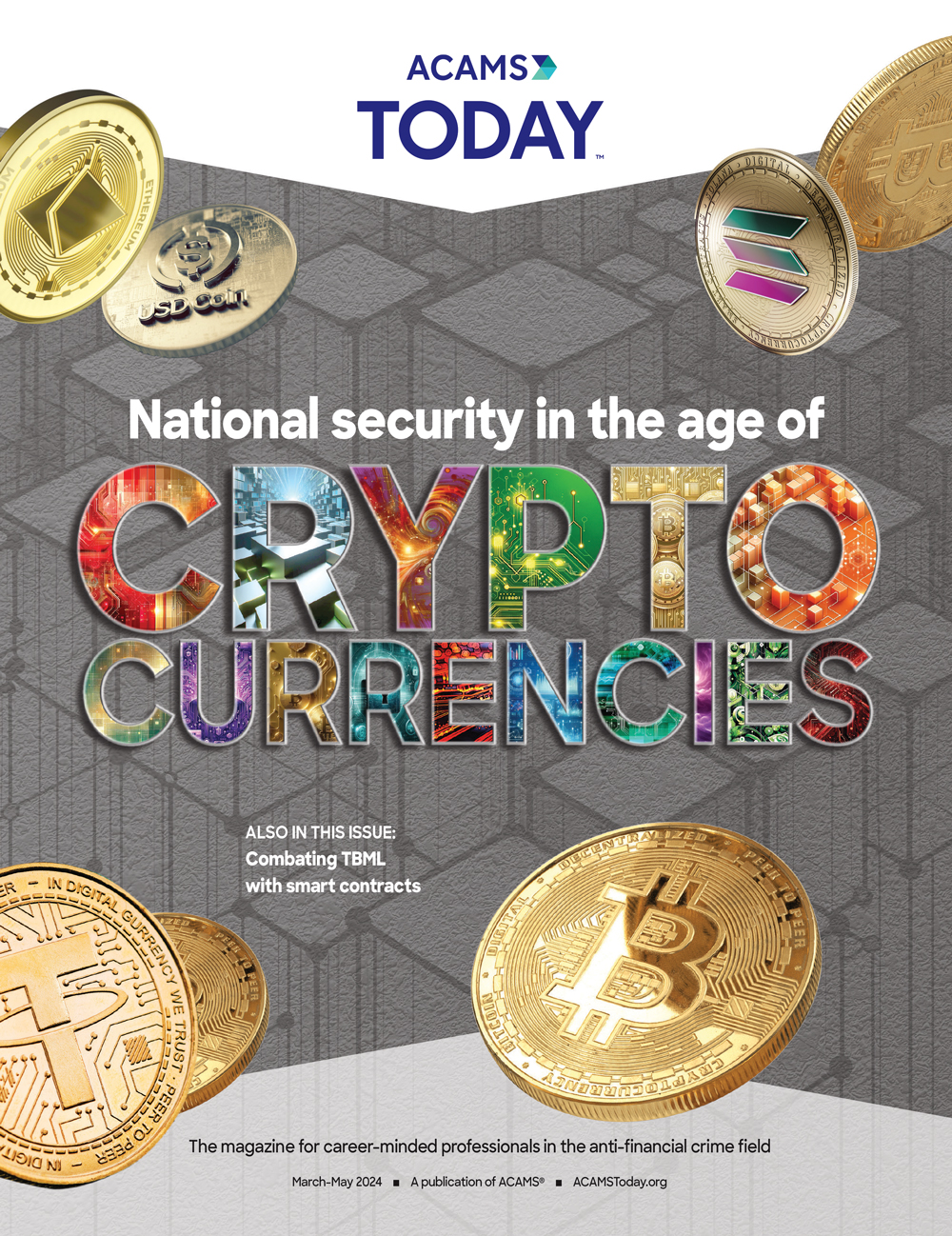Featured
National Security in the Age of Cryptocurrencies
There are myriad illicit finance risks in the cryptocurrency ecosystem. Historically, anti-financial crime professionals have focused on preventing scams and the funds associated with darknet markets. But the digital ecosystem is growing exponentially, and it continues to collide not only with traditional finance but with matters of national security.
Combating TBML With Smart Contracts
Trade-based money laundering (TBML) is a sophisticated financial crime method that involves the manipulation of international trade transactions for the purpose of laundering illicit funds. In TBML schemes, criminals exploit the complexity of global trade to obscure the origins of illegally obtained money, making it appear as though it comes from legitimate commercial activities.
From the Editor
“A Great Big Beautiful Tomorrow”
In describing the vision underpinning “Tomorrowland,” Walt Disney said: “A vista into a world of wondrous ideas, signifying man’s achievements…a step into the future, with predictions of constructive things to come. Tomorrow offers new frontiers in science, adventure and ideas….” He could have been referencing blockchain and cryptocurrencies.
Inside this Edition
- Acceso LatAm
- AFC Challenges
- AFC Policy
- Career Guidance
- Compliance
- Europe Express
- Global Financial Crime Review
- Interviews
- Know Your Chapter
- Meet the ACAMS Staff
- Member Spotlights
- Practical Solutions
- Regulatory Initiatives
Bitcoin as Legal Tender in El Salvador: A Case Study
In September 2021, El Salvador made global headlines by becoming the first nation to embrace bitcoin as legal tender—an unprecedented move that sent ripples through traditional financial systems.
The Black Market for Used Cooking Oil
Restaurants across the U.S. are now the targets of thieves who are not interested in stealing money per se but something just as valuable: Used cooking oil.
A New Threat on the Horizon: AI-Generated CSAM
Artificial intelligence (AI) has opened the gates to a new horrific era in which perpetrators of crimes against children can generate ultrarealistic AI child sexual abuse material (CSAM) at the click of a button.
AFC in 2024: Emerging Typologies in Banking
The anti-financial crime (AFC) system in a bank is always a chess game in which several compliance officers play against thousands of international criminals.
National Security in the Age of Cryptocurrencies
There are myriad illicit finance risks in the cryptocurrency ecosystem. Historically, anti-financial crime professionals have focused on preventing scams and the funds associated with darknet markets. But the digital ecosystem is growing exponentially, and it continues to collide not only with traditional finance but with matters of national security.
The Possible Effects of the Beneficial Ownership Rule
All financial institutions (FIs) are now contending with the changes in the Beneficial Ownership Rule that went into effect on January 1, 2024. The objective of the Beneficial Ownership Rule established in May 2018 was for FIs to know the “who” of your customer’s relationships when they are onboarded.
2024: Predicting AFC Employment Trends
I was apprehensive about writing this piece because 2023 was the year of false prophets and incorrect predictions. Everyone from the armchair economists (like me) and professional macroeconomists with Ph.D.s could not read the tea leaves of 2023 with accuracy.
Chatbots in Recruitment: A Weapon of Fraud?
Is the next big threat in recruitment lurking in the shadows of artificial intelligence (AI)? The rapid advancement of AI and natural language processing technologies has led to sophisticated chatbots, like the infamous OpenAI’s ChatGPT, Google’s Bard and Microsoft Edge’s Copilot.
Balancing the Scale of Global Good and Business Outcomes
As the anti-financial crime space continues to witness the unfolding environmental, social and governance (ESG) discourse that has brought both praise and skepticism over the past year, a narrative emerges that encapsulates a broader evolution.
Exposing Money Laundering Techniques in Pig Butchering Scams
This article analyzes the financial aspects of pig butchering scams by focusing on the money laundering techniques and cryptocurrencies used by organized crime groups. This unprecedented form of fraud combines elements of cybercrime, crypto-assets, money laundering and human trafficking.
Banking Cannabis: The Issue of Dutch Coffee Shops
Growing cannabis in the Netherlands is illegal, yet over 500 coffee shops can legally sell the drug throughout the country. This bizarre duality, also known as gedoogbeleid, or tolerance policy, criminalizes the growing and sourcing of cannabis while authorities turn a blind eye to its sale.
ZuFinG and Collective Trust Accounts
The enactment of Section 1 (1) no. 2 of the German Anti-Money Laundering Act (GwG, for its acronym in German), as amended by Germany’s Future Financing Act (ZuFinG), paves the way for the system-compliant treatment of collective trust accounts for payment service providers (PSPs) and investment firms by credit institutions in Germany.
Germany Prepares for EU’s AML/CTF Regulation and AMLA
Germany is storming ahead in its efforts to improve its standing at the international level and install best-practice standards following the outcome of the Financial Action Task Force’s (FATF) Mutual Evaluation published in August 2023 and also in preparation for the arrival of the European Union’s (EU) first anti-money laundering/counter-terrorist financing (AML/CTF) regulation and the establishment of the EU supervisory organization, the Anti-Money Laundering Authority (AMLA).
Battling Financial Crime in the Global Payment System
The globe has become increasingly connected digitally, and cutting-edge innovations like artificial intelligence and machine learning have helped fuel this extraordinary rise.
Money Laundering Organizations and the Use of Counterfeit Chinese Passports
The Homeland Security Investigations (HSI) Cross-Border Financial Crime Center (CBFCC) is alerting U.S. financial institutions of the prevalent use of counterfeit Chinese passports by money laundering organizations to facilitate criminal activity.
Combating TBML With Smart Contracts
Trade-based money laundering (TBML) is a sophisticated financial crime method that involves the manipulation of international trade transactions for the purpose of laundering illicit funds. In TBML schemes, criminals exploit the complexity of global trade to obscure the origins of illegally obtained money, making it appear as though it comes from legitimate commercial activities.
Howard Fields: Popular Compliance Roles, Fraud Trends and Giving Back
ACAMS Today recently spoke to Howard R. Fields, CAMS, chief compliance officer, executive vice president at Mastercard, about topics ranging from popular compliance roles in 2024 and white-collar crime to recent fraud trends and the importance of giving back to the community.
Rebecca Duff: Data Technology Empowerment
ACAMS Today sat down with Rebecca Duff, PMP, senior director of Client Success for Nucleus Analytics at Community Brands. She has over 15 years of experience in the software industry in a variety of roles ranging from business analysis to technical project management, program management to client success and product strategy.
ACAMS South Florida Chapter: First Annual Awards Dinner
On January 18, 2024, the ACAMS South Florida Chapter held its First Annual Awards Dinner and honored local colleagues for making significant contributions to the anti-financial crime community.
A Resounding Success: The Inaugural Launch of the ACAMS Kansas City Chapter
In the heart of Kansas City, a new chapter in the fight against financial crime has begun. The ACAMS Kansas City Chapter officially launched, marking a significant milestone in the region’s commitment to combating financial crime.
Mariah Gause: Bringing Solutions
ACAMS Today sat down with Mariah Gause, ACAMS’ chief operating officer, responsible for steering the organization’s strategic direction and overseeing key initiatives that will shape ACAMS’ long-term trajectory and impact across the anti-financial crime community.
Stephanie Bye, CAMS—Washington, USA
Stephanie Bye is the senior vice president of Financial Crimes for Quontic Bank. She has served as an anti-money laundering/Bank Secrecy Act (AML/BSA) expert in several capacities, including as a risk management examiner for the Federal Deposit Insurance Corporation, risk management officer at a California-based community bank and senior director of BSA at a large credit union.
Josh Ortner, CAMS—Ohio, USA
Josh Ortner is a passionate financial crime fighter and anti-money laundering (AML) professional. His career in AML launched after working as an investment oversight manager for a $4 billion donor-advised fund provider, where he reviewed potential money laundering and fine-print risks obscured within alternative and complex securities offerings.
Rayan Mohamed, CAMS, CFE—North Carolina, USA
Rayan Mohamed is a licensed attorney based in North Carolina. He holds the Certified Anti-Money Laundering Specialist (CAMS) and Certified Fraud Examiner (CFE) designations. With a robust background in the anti-money laundering/counter-terrorist financing (AML/CTF) industry spanning six years, Mohamed became part of Credit Suisse (now integrated into UBS Group) in 2020.
Federal Grand Jury Subpoenas for Financial Records: The Secrets Revealed
What is a federal grand jury subpoena? A federal grand jury subpoena for financial records is a document issued by the U.S. Attorney’s Office to compel action by a financial institution.
FedNow Is Here
First announced by the Federal Reserve Bank (Fed) in August of 2019, the first phase of FedNow, a new settlement product, went live on July 20, 2023. FedNow joins similar platforms that are already in existence across Europe and Asia, such as Single Euro Payments Area (SEPA), Faster Payments and New Payments Platform (NPP).







